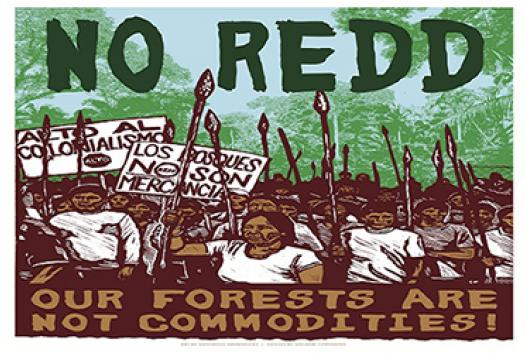Once again, the world's governments will meet at the end of this year within the United Nations convention framework to supposedly deal with the real and tangible problem of climate change. However, the agenda of the climate negotiations - mainly driven by governments of industrialized countries and corporate lobbying groups - follows the mantra of capital accumulation, which in terms of climate change it is translated in the carbon market. This mantra has led to a further increase of greenhouse gas emissions, deforestation and environmental destruction in general. This growing destruction is "accepted" and even promoted, as long as it is "offset" by a project elsewhere. It is primarily traditional, forest-dependent peoples who suffer the consequences; not only with the impacts of severe droughts, floods and many other changes in the climate, but also through the plundering and looting of their territories, due to the expanded extraction legitimated by the carbon market. The last (public) draft of the climate agreement to be implemented post-2020, and which is expected to come out of the negotiations this year in Paris, France, opens the door wide to market mechanisms such as REDD at a global scale (1).
What does this mean?
Carbon market mechanisms such as REDD have allowed the continuation, legitimization and intensification of destructive activities such as mining, oil, gas and coal, monoculture plantations, agribusiness, among others. This extractive model has resulted in dispossession, violence, criminalization, destruction and loss for hundreds of communities worldwide, and with them, their cultures, spirituality, knowledge, autonomy and control over their lives and territories (2). How can we speak of a mechanism that seeks to "stop deforestation" or "benefit forest peoples" when the underlying logic is to expand industrial scale extraction? Despite all the propaganda and speeches created to make us believe that REDD is a "viable solution", experience teaches us that what it is really seeking is to maintain an economy of capital accumulation which controls more territories and fills the pockets of just a few (3).
In this context, in December 2014, in the run-up to the climate negotiations that were held in Lima, Peru, over 150 organizations and movements from around the world launched a Call to Action to reject REDD and extractive industries, to curb capitalism and defend lives and territories (4). The Call stated that “One of the fundamental pillars of the new global capitalism is ‘environmental services’. This involves the further financialization and commodification of nature, and signifies subjugating it to capital. The carbon market, biodiversity offsets and water markets are part of this kind of capitalism.” And adds that “With REDD+, forests’ and soils’ capacity to absorb carbon and retain it, and plants’ capacity to grow, photosynthesize, conserve water, grow and generate biodiversity are being quantified, monetized, appropriated, privatized and financialized, just as with any other commodity. The ‘environmental services’ trade also fuels the impunity of polluters and destroyers: instead of complying with laws that prohibit polluting and deforestation, they can ‘compensate’ for these ills. This trade also diverts attention from combatting climate change, as it does not address the cause.”
An important step in this Call was to clearly articulate the criticism of REDD with its implications in the expansion of the extractive model, as its proponents constantly use a discourse of "local participation," "improving forest management," "improving living conditions and development of local populations" and even "implementing territorial rights". Nevertheless, as stated in the Call, “Corporations like Shell Oil or Rio Tinto mining corporation; tree plantations and pulp and paper producers like Green Resources and Suzano; agribusiness firms like Wilmar, Monsanto and Bunge; multilateral agencies like the UNDP and FAO; conservation transnationals like Wildlife Works, WWF, The Nature Conservancy or Conservation International; consulting firms, public and private banks and many governments elaborate, support and fund REDD+ (…) These mechanisms undermine the real solutions to climate change, as they serve as a distraction from changes to the modes of production and consumption and towards economies and societies that are free from fossil fuels”
However, the pro-carbon market and REDD campaign intensifies as we approach the negotiations this year, where an agreement on REDD is expected to be reached, disregarding the evidence gathered about the harmful impacts of this mechanism. “Climate negotiations, which are increasingly controlled by corporate power, do not try to save the climate, nor protect forests and soils, eradicate poverty or respect indigenous peoples’ rights. On the contrary, they cravenly protect predatory corporations and reinforce a destructive and patriarchal model.”
Therefore, we once again denounce that the decisions to move forward with carbon markets and related mechanisms, taken in conference rooms by white-collar representatives, do not reflect the reality of peoples and forests, and much less reflect the urgent need to initiate a real transition away from an economic model thirsty for fossil fuels. To continue with the carbon market mantra would mean to continue with the imposition of destructive projects on those people who have defended their forests and territories for generations. We reiterate the request to organizations, social movements, groups and networks to join the Call to Action to strengthen the voices coming from the forests which teach us the true consequences of these mechanisms. To fight against REDD+ is also to fight capitalism!
You can join the Call here: http://wrm.org.uy/all-campaigns/to-reject-redd-and-extractive-industries-to-confront-capitalism-and-defend-life-and-territories/
- http://unfccc.int/resource/docs/2015/adp2/eng/4infnot.pdf
- See more information in: http://wrm.org.uy/browse-by-subject/mercantilization-of-nature/redd/
- See for example: http://wrm.org.uy/books-and-briefings/redd-a-collection-of-conflicts-contradictions-and-lies/
- http://wrm.org.uy/wp-content/uploads/2014/11/Call-COP-Lima_NoREDD.pdf
